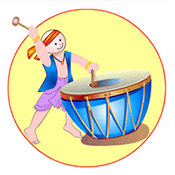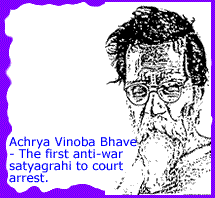
Dimdima
Online Children's Magazine from India

Dimdima
Online Children's Magazine from India
| "Leave India to God… or to Anarchy" |
|
The Congress called off the Civil Disobedience movement in 1934 by which time
the movement had run out of steam. In June the same year the government lifted
the ban on the Congress. |
Could Indians fight for others while they themselves were not free?
The Viceroy gave vague assurances for the future which did not satisfy anyone.
The Congress disassociated itself from the war efforts and the Congress
ministries in the provinces resigned.
 Gandhiji
launched the individual satyagraha to press for freedom to speak out against the
war. Acharya Vinoba Bhave was the first one to court arrest, on 21 October 1940,
followed by Jawaharlal Nehru, Maulana Azad, Rajagopalachari and hundreds of
Congress volunteers.
Gandhiji
launched the individual satyagraha to press for freedom to speak out against the
war. Acharya Vinoba Bhave was the first one to court arrest, on 21 October 1940,
followed by Jawaharlal Nehru, Maulana Azad, Rajagopalachari and hundreds of
Congress volunteers.
Subhas Chandra Bose was arrested for expressing the view that India would gain
if Britain were defeated in the war.
Bose who had been elected president of the Congress for a second term in 1939
and had shortly afterwards resigned because of differences with senior Congress
leaders, was convinced that Britain could be dislodged from India only by force
of arms. When he was released from prison due to ill-health, he felt the time
had come to put his plans into action and left the country.
In 1941, the war-time Prime Minister of Britain, Winston Churchill and President
Roosevelt of America, issued a joint statement which came to be known as the
Atlantic Charter. Article III of the Charter stated that England and America
respect the "right of people to choose the form of government under which they
will live" and that they wanted "sovereign rights and self-government restored
to those who have been forcibly deprived of them".
These were the sort of assurances India wanted in exchange for her help in the
war but they were not forthcoming. Churchill made it clear that the charter
applied only to Europe.
On 7 December, 1941, Japan attacked Pearl Harbour. In the next few days they
bombed Singapore and occupied Malaya and Thailand and suddenly, the war which
had till then seemed far away, confined to Europe and North Africa, was at
India's door- step.
At America's insistence Britain once again tried to get the support of Congress
for the war. Sir Stafford Cripps arrived in India in March 1942 with fresh
proposals but Gandhiji was not impressed. He called the proposals "a post-dated
cheque". To which a reporter added "…on a bank that is failing."
Even Englishmen friendly to India were confused. They could not understand why
India was adamant in refusing to support Britain when her own security was
threatened by the expansionist aims of the Japanese.
But Gandhiji was convinced that India could work out her own solution to the
Japanese threat. He called upon British troops to withdraw from India. In a
terse statement, Gandhiji told Britain: "Leave India to God — or to anarchy."
Dimdima is the Sanskrit word for ‘drumbeat’. In olden days, victory in battle was heralded by the beat of drums or any important news to be conveyed to the people used to be accompanied with drumbeats.
Bharatiya Vidya Bhavan
K. M Munshi Marg,
Chowpatty, Mumbai - 400 007
email : editor@dimdima.com
Bharatiya Vidya Bhavan
505, Sane Guruji Marg,
Tardeo, Mumbai - 400 034
email : promo@dimdima.com
Dimdima.com, the Children's Website of Bharatiya Vidya Bhavan launched in 2000 and came out with a Printed version of Dimdima Magazine in 2004. At present the Printed Version have more than 35,000 subscribers from India and Abroad.